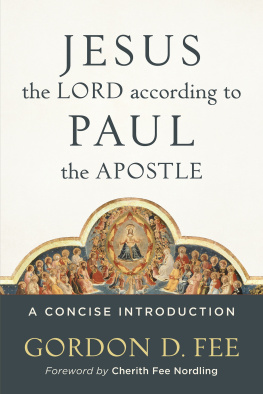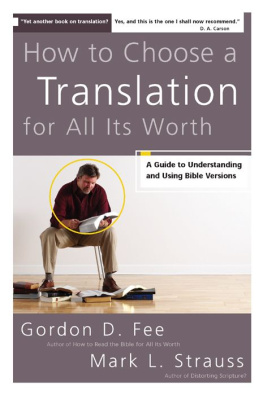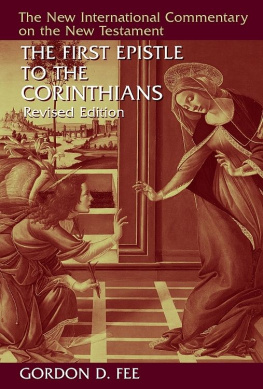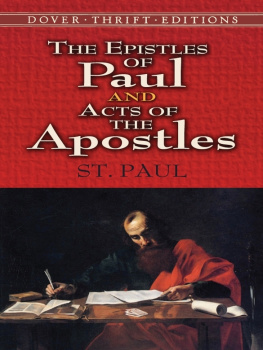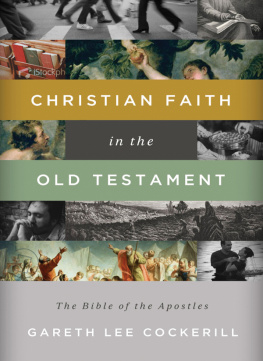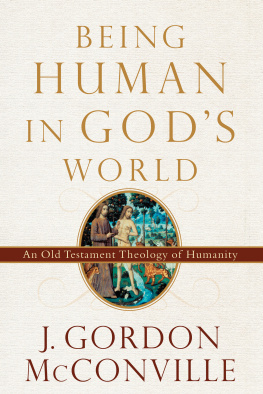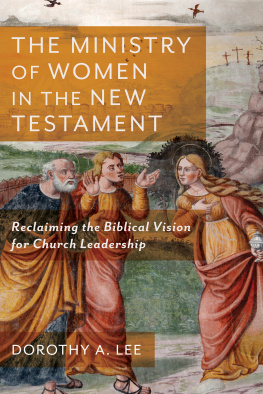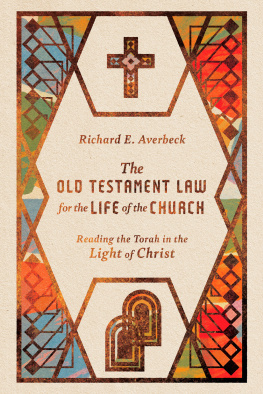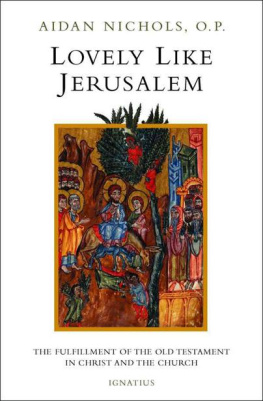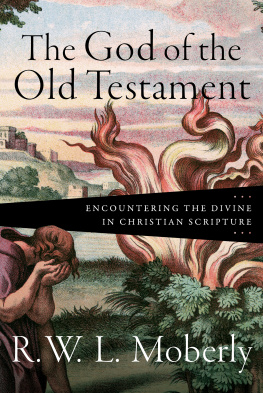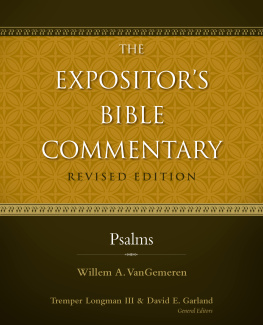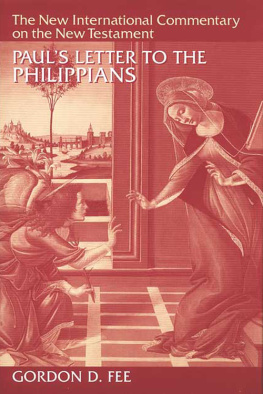Offer Yourselves to God
Vocation, Work, and Ministry in Pauls Epistles
Gordon D. Fee
Edited by Jeffrey P. Greenman
Foreword by R. Paul Stevens
Offer Yourselves to God
Vocation, Work, and Ministry in Pauls Epistles
Copyright 2019 Gordon D. Fee. All rights reserved. Except for brief quotations in critical publications or reviews, no part of this book may be reproduced in any manner without prior written permission from the publisher. Write: Permissions, Wipf and Stock Publishers, W. th Ave., Suite , Eugene, OR 97401 .
Cascade Books
An Imprint of Wipf and Stock Publishers
W. th Ave., Suite
Eugene, OR 97401
www.wipfandstock.com
paperback isbn: 978-1-5326-9422-6
hardcover isbn: 978-1-5326-9423-3
ebook isbn: 978-1-5326-9424-0
Cataloguing-in-Publication data:
Names: Fee, Gordon, author. | Greenman, Jeffrey P., editor. | Stevens, R. Paul, foreword.
Title: Offer yourselves to god : vocation, work, and ministry in pauls epistles. / by Gordon D. Fee; edited by Jeffrey P. Greenman; foreword by R. Paul Stevens.
Description: Eugene, OR: Cascade Books, 2019. | Includes bibliographical references.
Identifiers: isbn 978-1-5326-9422-6 ( paperback ) | isbn 978-1-5326-9423-3 ( hardcover ) | isbn 978-1-5326-9424-0 ( ebook )
Subjects: LCSH: Paul, the Apostle, Saint. | Bible. Epistles of PaulTheology. | VocationBiblical teaching.
Classification: BS2655.V6 F44 2019 ( paperback ) | BS2655.V6 ( ebook )
Manufactured in the U.S.A. 11/11/19
All Scripture quotations, unless otherwise indicated, are taken from the Holy Bible, New International Version, NIV. Copyright 1973 , 1978 , 1984 , 2011 by Biblica, Inc. Used by permission of Zondervan. All rights reserved worldwide. www.zondervan.com The NIV and New International Version are trademarks registered in the United States Patent and Trademark Office by Biblica, Inc.
Table of Contents
Foreword
I was there when Gordon Fee delivered this series of lectures at the Regent College Pastors Conference in 2002 . My soul was gripped thenand now, as I revisit them years later. These four lectures provide a detailed analysis of the context of Pauls writing, including the patron-client system, the household, and the values of the ancient world. But through it all Fee expounds Pauls grasp of the gospel of Christ, and how this leads people to embrace a cruciform life. This is exactly what we need today.
In the first lecture, Fee demolishes the widespread identification of vocation with occupation. Vocation is a truly redemptive and renewing summons to be in the fellowship of Christ (both in fellowship with the Lord and in fellowship with the Lords people). In fact, this is the only understanding of calling in the New Testament, says Fee. In this context, he deals strategically with the grossly misunderstood words of Paul in Corinthians :, , and . In my opinion, his treatment of this complex and often badly translated passage is worth the whole book. But there is more in the second lecture.
There is more because Pauls context for his teaching is the first-century household. In the ancient world, the household was where work and industry were accomplished together, unlike today where human enterprise and human dwelling are largely separated. Further, in the social structure of the Greek and Roman worlds, the male was normally husband, master, and patron. But instead of exerting absolute authority in these relationships, such male leaders were called through Christ to make a radical reversal. The church would not survive, Fee concludes, unless the man willingly submitted himself to the whole family and chose to live as one who would offer his life for the sake of others. Pastoral leadership style is a crucial matter; remuneration is another. Fees comments on pastoral salaries and fees for service are as revolutionary today as they were then. So, appropriately, in the next lecture Fee turns to the subject of Paul and work.
In the social context of the first century, the privileged people, unlike the vast majority, did not work with their own hands. Here, Fee unpacks the ironic passage where Paul defends his right to be supported financially as an apostle, but then refuses that right for himself by working with his own hands. And the reason? To avoid hindering the gospel. In wrestling with this enigma, Fee challenges the contemporary professional, commercial, and corporate models of pastoral ministry where income for living is viewed as salary rather than gift. By expressing this high view of work, in which both God and neighbor are served, Fee effectively destroys the dualism that plagues the global church today: some work (pastoral ministry) is holy; other work is secular. This distinction is gone with Paul.
Finally, Fee turns to the subject of ministry in the Pauline letters. He debunks the usual understanding of two-level ministry: ordinary ministry for Christians who earn their living in the so-called secular workplace, and the ministry for people called into pastoral leadership or traditional missionary service. He argues convincingly that there simply is no clergy/laity division in the New Testament vision of the people of God. Ministry is simply serving God and others. Full stop. And so Fee ends with a great vision of churches not only recognizing people who are stepping into church positions, but also praying for and commissioning those whose ministry is primarily in the world through their daily work. All of this, Fee concludes, requires a person who, with a renewed mind, conforms themselves to the image of Christ... in service to the world. Yes.
This is classic Fee: personally passionate (yes, even in print), impeccably exegetical, and eloquently (and disturbingly) applicable to our contemporary situation. Simply beautiful.
R. Paul Stevens
Professor Emeritus, Marketplace Theology, Regent College
Chairman, Institute for Marketplace Transformation
Editors Introduction
I n a series of four lectures given at a conference at Regent College in 2002 , Gordon Fee explored the Pauline understanding of Vocation, Work, and Ministry. His aim was to help pastors and laypeople serving God in a variety of settings to become theologically and biblically formed for their full-time service for God. These materials have been edited with attention to making an oral text readable, while retaining the more informal and personal communication inherent in a lecture presentation. I am especially grateful to Richard Wu for his assistance in the preparation of this manuscript. Readers should bear in mind that these lectures do not intend to offer a comprehensive treatment of the subject, but to provide an insightful biblical perspective on major themes in relation to vocation, work, and ministry. My hope is that a new generation of students, pastors, and lay Christians, whose daily work encompasses all walks of life, would be challenged and encouraged by this teaching from one of the leading evangelical scholars of his generation.
Jeffrey P. Greenman
President, Regent College
Think of What You Were
Paul and the Concept of Vocation
Introduction
T his book will explore the themes of vocation, work, and ministry in Pauline perspective. As we begin, I want us to note that our sociology, meaning our social experience both in the church and in the larger culture, is radically different from that of the New Testament. While I was thinking through these themes one afternoon, I walked across the street to a corner grocery and picked up the weekend issue of our local paper. I was struck by the different sections: Careers , Business , Homes , Wheels , Travel . Thats the world we live in. Try to put the apostle Paul into that world!



